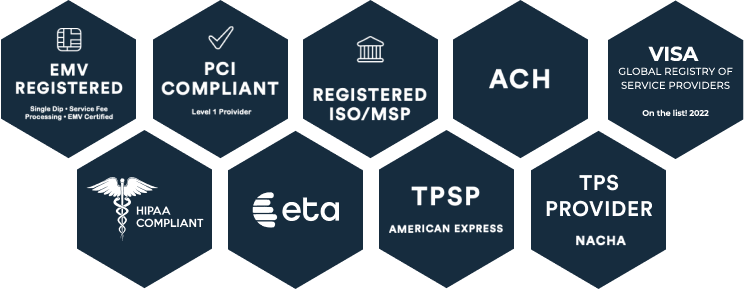As pillars of the public, government organizations contribute to the stability and functionality of society, ensuring citizens receive necessary support, protection, and opportunities for growth.
Digital payments are now an integral piece of the government financial landscape. As governments strive to deliver services to the public as efficiently as possible, the need for robust security measures has never been more critical.
The responsibility to safeguard public funds—and maintain trust with constituents—falls on government compliance managers, CTOs, comptrollers and auditors, finance teams, and Treasurers. To ensure the integrity of government payment systems, the public sector needs proactive measures and a solid response plan to prevent government fraud in payment acceptance, processing, and reconciliation.
How is this achieved? It requires establishing a collective framework formed through numerous resilient security strategies.
By implementing secure technologies, stringent verification processes, and advanced monitoring, government teams can foster a secure financial framework that benefits both citizens and municipalities alike. Here are some key insights.
Government Fraud in Payments: An Overview
Government fraud in payments refers to any deceptive or fraudulent activities in the context of government financial transactions—including unauthorized account access, the misappropriation of funds, and misuse of public funds.
This type of government fraud can occur at various levels of the payment process, including the initiation, authorization, processing, and reconciliation of payments.
Government fraud in payments can involve several practices, including:
- Altered documentation
- Embezzlement
- False billing
- Forgery
- Identity theft
- Kickbacks
- Unauthorized use of government accounts
- Unsubstantiated reimbursement
Essentially, government fraud in payments encompasses any practice aimed at diverting public funds for unauthorized purposes. The digitization of public financial systems introduces new challenges for online payment fraud prevention.
Because public financial systems involve essential funds and taxpayer dollars, dedicated government fraud detection systems are paramount to combat fraud—and ensure government accountability.
The Crucial Role of Fraud Prevention
Whether through error or fraudulent activity, improper payments pose a challenge for government agencies and their allocated resources. The Joint Financial Management Improvement Program estimated that, in 2021, improper payments totaled approximately $281 billion.
That’s $281 billion diverted away from its intended use.
The well-being of communities, and society as a whole, hinges on government organizations who provide essential services and address the needs of the public. Effectively preventing government fraud is not just a protective measure; it’s an inherent responsibility to the overall health and welfare of any jurisdiction.
Government fraud detection and prevention are vital for upholding the integrity and trust of public institutions. Entities in the public sector are held to high ethical standards and must prioritize safety and security. Successful fraud prevention is as much a part of fostering a thriving community as any other civic responsibility. In some cases, it may be even more so, considering its impact on upholding the fabric of a secure community.
An Overview of 7 Best Practices
Adopting government fraud prevention best practices is instrumental in maintaining the resilience of public systems.
According to the U.S. Government Accountability Office’s Fraud Risk Management Framework, a framework rooted in leading practices for both prevention and response is crucial to successfully manage fraud risk mitigation for government programs. Such a framework can only work when multiple strategies are implemented at once.
Fortunately, an anti-fraud plan builds off strategic momentum. These seven strategic measures can work together to form a strong defense.
1. Establishing Robust Internal Controls
The first line of defense involves setting a foundation for internal fraud prevention.
- Segregation of Duties: Distributing tasks can prevent a single point of failure and increase individual accountability.
- Authorization Protocols: Stringent protocols for authorization ensure that only authorized personnel can initiate and approve transactions.
- Regular Audits and Reconciliation: Routine audits and reconciliations can detect discrepancies to ensure financial records align with actual transactions.
2. Vendor Verification and Due Diligence
Government organizations that work with external service providers should thoroughly validate vendor details to ensure accuracy and legitimacy. This includes:
- Conducting background checks on vendors
- Reviewing contractual considerations
- Screening potential vendors
- Evaluating vendor compliance
- Continuous monitoring mechanisms
The goal is to assess the reliability of the vendor against strict criteria and standards before entering into a business relationship. However, ongoing evaluation of their practices, compliance standards, and cybersecurity measures are essential aspects of due diligence.
3. Secure Payment Processing Systems
A government’s digital payment systems require measures for online payment fraud prevention, such as:
- Utilizing robust encryption methods to ensure the secure transmission of payment data
- Implementation of strict access controls and user permissions to restrict unauthorized access
- Regularly updating payment processing software to the latest, most secure versions
- Addressing potential software vulnerabilities with prompt security patches
These security measures are necessary to maintain smooth payment processing and to bolster built-in mechanisms for fraud prevention and detection.
4. Employee Training and Awareness
Government teams lay the groundwork for internal fraud prevention by educating employees on recognizing fraudulent activity. These strategies increase awareness around government compliance standards, security risks, and government fraud—and establish channels for prevention:
- Training: Comprehensive training programs educate employees on how to detect fraudulent activity when they see it.
- Reporting: Clear and confidential reporting channels allow employees to report suspected fraud.
- Promoting: A work culture that emphasizes ethical conduct encourages employee honesty and integrity.
Educated employees are more likely to report concerns accurately and provide relevant information for any potential investigation, which is essential for timely response and resolution.
5. Data Analytics and Monitoring
Digital payment systems benefit from automated processes that streamline government payment processing. A well-integrated system also comes equipped with automated security measures.
These typically include:
- Data analytics tools to detect anomalies
- Real-time monitoring of suspicious activity
- Instantaneous alerts to notify personnel of potential fraud
- Data reporting systems to track unusual transactions
Secure payment processing platforms offer these features at the outset, only requiring proper training and implementation. Once implemented, these technologies powerfully streamline government fraud detection efforts.
6. Whistleblower Protection
Fraudulent activity undermines security for an entire organization, but this may have an unintended cascading effect. While employees play a pivotal role in reporting security concerns, they need an environment to do so without fear of repercussions.
This is where whistleblower protection comes in. Clear policies should encourage reporting while protecting anyone who comes forward. These policies might include:
- Anonymous reporting mechanisms
- Clear guidelines for disclosure, including the limits of individual responsibility
- Periodic check-ins with assurances of confidentiality
- Legal safeguards from adverse outcomes
Higher officials and immediate supervisors need to engage with and promote these policies regularly—especially for government finance teams.
7. Collaboration with Law Enforcement
Government finance teams are not alone in handling fraudulent activity. Active collaboration with law enforcement agencies at the local and federal levels is invaluable for information and assistance with government fraud concerns.
In the event of a case escalation that requires collaboration with authorities, government officials should:
- Promptly report suspected fraud cases for investigation as soon as possible.
- Cooperate with the appropriate authorities, sharing all necessary information.
- Follow through with legal action, including prosecution of the parties involved.
These collaborations allow government agencies to work within the bounds of the law, ensuring investigations are conducted effectively.
Government Fraud Prevention: A Real-World Example
In 2020, the Department of Justice (DOJ) successfully secured over $2.2 billion in settlements and judgments from various civil cases involving government fraud and false claims, primarily in the healthcare industry.
Due to the False Claims Act, which was established to redress false claims for federal funds across government operations, the DOJ, aided by numerous whistleblowers, recovered funds unlawfully acquired through multiple fraud schemes—funds that may have otherwise been overlooked if it weren’t for diverse fraud prevention efforts.
Ultimately, the dedication of public servants with insider insights, bolstered by strong government fraud detection systems, was instrumental in the success of protecting taxpayer dollars, underscoring the considerable value of well-rounded and ongoing fraud prevention efforts.
CORE’s Commitment to Security and Compliance
Municipalities must take payment fraud seriously. CORE is dedicated to protecting government payments in the following ways:
With CORE, governments gain access to proactive protections to uphold the integrity of their organizations and the essential public programs they oversee.






